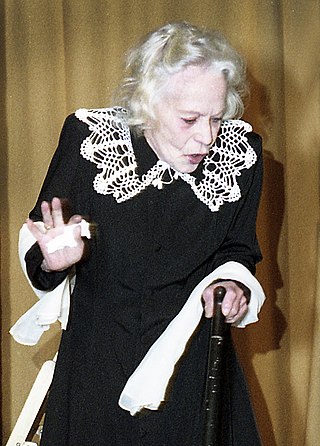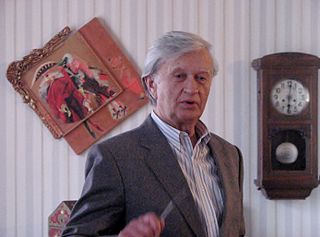Eesti Televisioon (ETV) is an Estonian free-to-air television channel owned and operated by Estonian Public Broadcasting. It made its first broadcast on 19 July 1955.

Eesti Rahvusringhääling (ERR) – Estonian Public Broadcasting – is a publicly funded and owned radio and television organisation created in Estonia on 1 June 2007 to take over the functions of the formerly separate Eesti Raadio (ER) and Eesti Televisioon (ETV), under the terms of the Estonian National Broadcasting Act. The first chair of ERR is Margus Allikmaa, the former chair of Eesti Raadio. Present CEO is Erik Roose.
Estonia participated in the Eurovision Song Contest 2008 with the song "Leto svet" written by Priit Pajusaar, Tarmo Leinatamm, Hannes Võrno, Peeter Oja and Glen Pilvre. The song was performed by the group Kreisiraadio. The Estonian broadcaster Eesti Rahvusringhääling (ERR) organised the national final Eurolaul 2008 in order to select the Estonian entry for the 2008 contest in Belgrade, Serbia. Ten songs competed in the national final and the winner was selected over two rounds of public voting. In the first round, the top three were selected to qualify to the superfinal. In the superfinal, "Leto svet" performed by Kreisiraadio was selected as the winner.
Estonia participated in the Eurovision Song Contest 2009 with the song "Rändajad" written by Sven Lõhmus. The song was performed by the group Urban Symphony. The Estonian broadcaster Eesti Rahvusringhääling (ERR) organised the national final Eesti Laul 2009 in order to select the Estonian entry for the 2009 contest in Moscow, Russia. Ten songs competed in the national final and the winner was selected over two rounds of voting. In the first round, a jury panel and a public vote selected the top two to qualify to the superfinal. In the superfinal, "Rändajad" performed by Urban Symphony was selected as the winner entirely by a public vote.
Estonia participated in the Eurovision Song Contest 2010 with the song "Siren" written by Robin Juhkental. The song was performed by Malcolm Lincoln and Manpower 4. The Estonian broadcaster Eesti Rahvusringhääling (ERR) organised the national final Eesti Laul 2010 in order to select the Estonian entry for the 2010 contest in Oslo, Norway. Ten songs competed in the national final and the winner was selected over two rounds of voting. In the first round, a jury panel and a public vote selected the top two to qualify to the superfinal. In the superfinal, "Siren" performed by Malcolm Lincoln and Manpower 4 was selected as the winner entirely by a public vote.
Estonia participated in the Eurovision Song Contest 2011 with the song "Rockefeller Street" written by Sven Lõhmus. The song was performed by Getter Jaani. The Estonian broadcaster Eesti Rahvusringhääling (ERR) organised the national final Eesti Laul 2011 in order to select the Estonian entry for the 2011 contest in Düsseldorf, Germany. The national final consisted of three shows: two semi-finals and a final. Ten songs competed in each semi-final and the top five from each semi-final as determined by a jury panel and public vote qualified to the final. In the final, the winner was selected over two rounds of voting. In the first round, a jury panel and a public vote selected the top two to qualify to the superfinal. In the superfinal, "Rockefeller Street" performed by Getter Jaani was selected as the winner entirely by a public vote.
Estonia participated in the Eurovision Song Contest 2012 with the song "Kuula" written by Ott Lepland and Aapo Ilves. The song was performed by Ott Lepland. The Estonian broadcaster Eesti Rahvusringhääling (ERR) organised the national final Eesti Laul 2012 in order to select the Estonian entry for the 2012 contest in Baku, Azerbaijan. The national final consisted of three shows: two semi-finals and a final. Ten songs competed in each semi-final and the top five from each semi-final as determined by a jury panel and public vote qualified to the final. In the final, the winner was selected over two rounds of voting. In the first round, a jury panel and a public vote selected the top two to qualify to the superfinal. In the superfinal, "Kuula" performed by Ott Lepland was selected as the winner entirely by a public vote.
Radio in Estonia started on 21 October 1918, when special station for radio communications was established by Estonian Defence Ministry.
Estonia participated in the Eurovision Song Contest 2013 with the song "Et uus saaks alguse" written by Mihkel Mattisen and Silvia Soro. The song was performed by Birgit. The Estonian broadcaster Eesti Rahvusringhääling (ERR) organised the national final Eesti Laul 2013 in order to select the Estonian entry for the 2013 contest in Malmö, Sweden. The national final consisted of three shows: two semi-finals and a final. Ten songs competed in each semi-final and the top five from each semi-final as determined by a jury panel and public vote qualified to the final. In the final, the winner was selected over two rounds of voting. In the first round, a jury panel and a public vote selected the top two to qualify to the superfinal. In the superfinal, "Et uus saaks alguse" performed by Birgit was selected as the winner entirely by a public vote.
Estonia participated in the Eurovision Song Contest 2014 with the song "Amazing" written by Timo Vendt and Tatjana Mihhailova. The song was performed by Tanja. The Estonian broadcaster Eesti Rahvusringhääling (ERR) organised the national final Eesti Laul 2014 in order to select the Estonian entry for the 2014 contest in Copenhagen, Denmark. The national final consisted of three shows: two semi-finals and a final. Ten songs competed in each semi-final and the top five from each semi-final as determined by a jury panel and public vote qualified to the final. In the final, the winner was selected over two rounds of voting. In the first round, a jury panel and a public vote selected the top two to qualify to the superfinal. In the superfinal, "Amazing" performed by Tanja was selected as the winner entirely by a public vote.
Estonia participated in the Eurovision Song Contest 2016 with the song "Play" written by Fred Krieger, Stig Rästa and Vallo Kikas. The song was performed by Jüri Pootsmann. The Estonian broadcaster Eesti Rahvusringhääling (ERR) organised the national final Eesti Laul 2016 in order to select the Estonian entry for the 2016 contest in Stockholm, Sweden. The national final consisted of three shows: two semi-finals and a final. Ten songs competed in each semi-final and the top five from each semi-final as determined by a jury panel and public vote qualified to the final. In the final, the winner was selected over two rounds of voting. In the first round, a jury panel and a public vote selected the top three to qualify to the superfinal. In the superfinal, "Play" performed by Jüri Pootsmann was selected as the winner entirely by a public vote.
Estonia participated in the Eurovision Song Contest 2017 with the song "Verona" written by Sven Lõhmus. The song was performed by Koit Toome, who had previously represented Estonia in the Eurovision Song Contest in 1998 where he placed twelfth with the song "Mere lapsed", and Laura, who had previously represented Estonia in the Eurovision Song Contest in 2005 as part of the group Suntribe where she failed to qualify to the final with the song "Let's Get Loud". The Estonian broadcaster Eesti Rahvusringhääling (ERR) organised the national final Eesti Laul 2017 in order to select the Estonian entry for the 2017 contest in Kyiv, Ukraine. The national final consisted of three shows: two semi-finals and a final. Ten songs competed in each semi-final and the top five from each semi-final as determined by a jury panel and public vote qualified to the final. In the final, the winner was selected over two rounds of voting. In the first round, a jury panel and a public vote selected the top three to qualify to the super final. In the super final, "Verona" performed by Koit Toome and Laura was selected as the winner entirely by a public vote.

Salme Reek was an Estonian stage, film, radio, and television actress and stage director whose career spanned nearly seventy years; sixty-six of which were spent as an actress at the Estonian Drama Theatre.
Estonia participated in the Eurovision Song Contest 2018 with the song "La forza" written by Mihkel Mattisen, Timo Vendt, Ksenia Kuchukova and Elina Nechayeva. The song was performed by Elina Nechayeva. The Estonian broadcaster Eesti Rahvusringhääling (ERR) organised the national final Eesti Laul 2018 in order to select the Estonian entry for the 2018 contest in Lisbon, Portugal. The national final consisted of three shows: two semi-finals and a final. Ten songs competed in each semi-final and five from each semi-final as determined by a jury panel and public vote qualified to the final. In the final, the winner was selected over two rounds of voting. In the first round, a jury panel and a public vote selected the top three to qualify to the superfinal. In the superfinal, "La forza" performed by Elina Nechayeva was selected as the winner entirely by a public vote.
Vikerraadio is an Estonian national radio channel of Eesti Rahvusringhääling. It began broadcasting on April 3, 1967. Ingrid Peek has been the editor-in-chief since August 7, 2017.
Estonia originally planned to participate in the Eurovision Song Contest 2020 with the song "What Love Is" written by Uku Suviste and Sharon Vaughn. The song was performed by Uku Suviste. The Estonian broadcaster Eesti Rahvusringhääling (ERR) organised the national final Eesti Laul 2020 in order to select the Estonian entry for the 2020 contest in Rotterdam, Netherlands. The national final consisted of three shows: two semi-finals and a final. Twelve songs competed in each semi-final and six from each semi-final as determined by a jury panel and public vote qualified to the final. In the final, the winner was selected over two rounds of voting. In the first round, a jury panel and a public vote selected the top three to qualify to the superfinal. In the superfinal, "What Love Is" performed by Uku Suviste was selected as the winner entirely by a public vote.
Estonia participated in the Eurovision Song Contest 2021 with the song "The Lucky One" written by Uku Suviste and Sharon Vaughn. The song was performed by Uku Suviste. The Estonian broadcaster Eesti Rahvusringhääling (ERR) organised the national final Eesti Laul 2021 in order to select the Estonian entry for the 2021 contest in Rotterdam, Netherlands. The national final consisted of three shows: two semi-finals and a final. Twelve songs competed in each semi-final and six from each semi-final as determined by a jury panel and public vote qualified to the final. In the final, the winner was selected over two rounds of voting. In the first round, a jury panel and a public vote selected the top three to qualify to the superfinal. In the superfinal, "The Lucky One" performed by Uku Suviste was selected as the winner entirely by a public vote.
AS Postimees Grupp, formerly known as AS Postimees and AS Eesti Meedia, is an Estonian media holding company headquartered in Tallinn. The company is currently owned by MM Group, having acquired the half of the company from Norwegian company Schibsted in 2013 and bought the remaining half in 2015. The group is one of the largest media group in the Baltics. Among the Group's activities are creation of print and online media, production of television and radio, e-commerce.

Hans Kaldoja was an Estonian stage, television, film, and radio voice actor whose career began in the mid-1960s. Kaldoja was employed at the Estonian Drama Theatre for twenty-seven years; from 1965 until 1992, appearing in over one hundred theatre roles, before becoming a freelance actor. He has also recorded nearly two hundred audiobooks for the Estonian Library for the Blind.


